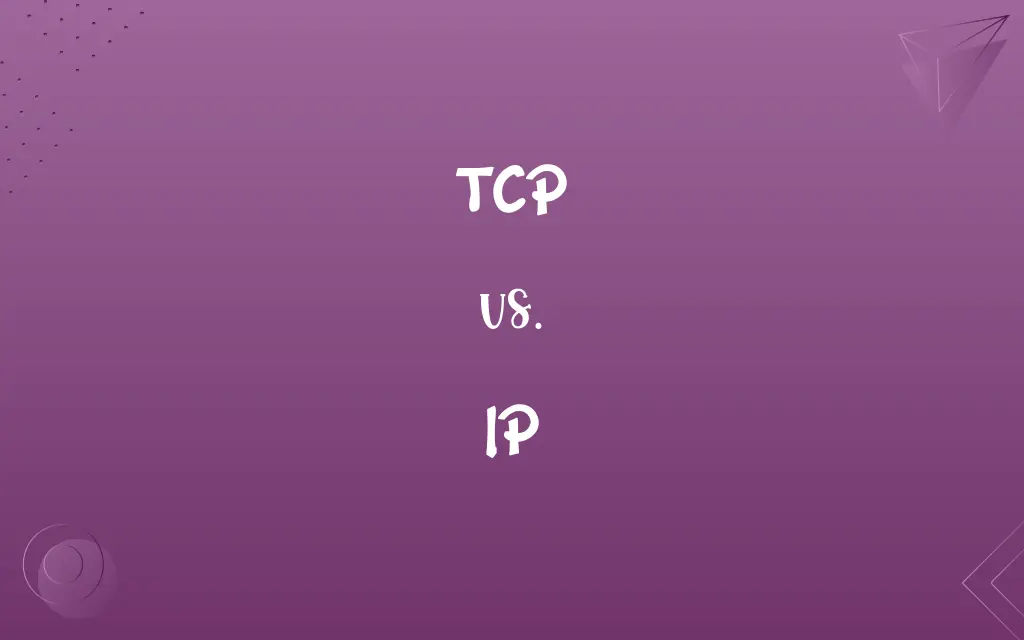TCP vs. IP: Know the Difference

By Shumaila Saeed || Published on February 14, 2024
TCP (Transmission Control Protocol) manages data packet transmission ensuring reliability and order, while IP (Internet Protocol) handles addressing and routing data packets across networks.

Key Differences
TCP ensures reliable and ordered delivery of data over a network, confirming that data reaches its destination correctly. IP, on the other hand, is responsible for addressing and routing packets of data so they can travel across networks to the correct destination. Both protocols are crucial for the successful transmission of data over the internet.
Shumaila Saeed
Feb 14, 2024
TCP is like a quality assurance manager, ensuring no data loss and proper sequencing during transmission. IP acts more like a postal service, determining the best routes for data packets to travel across various networks. Each plays a unique role in the efficient and accurate delivery of data.
Shumaila Saeed
Feb 14, 2024
TCP provides mechanisms for controlling the flow and congestion of data, ensuring that networks do not become overloaded. IP is designed to be agnostic to the underlying network technology, facilitating interoperability between different types of networks. Together, TCP and IP ensure efficient and flexible data communication.
Shumaila Saeed
Feb 14, 2024
In communication, TCP operates on a connection-oriented basis, establishing a connection before transmitting data. IP operates connectionlessly, treating each packet independently, with each possibly taking different paths to the destination. These approaches reflect their distinct responsibilities in data communication.
Shumaila Saeed
Feb 14, 2024
TCP includes features for error detection and correction, guaranteeing the integrity of data transmission. IP focuses on the address format and routing, lacking inherent mechanisms for error correction or data sequencing. Thus, TCP and IP complement each other, collectively enabling reliable internet communication.
Shumaila Saeed
Feb 14, 2024
ADVERTISEMENT
Comparison Chart
Function
Manages reliable transmission of data
Handles addressing and routing of packets
Shumaila Saeed
Feb 14, 2024
Responsibilities
Ensures data order, reliability, flow control
Determines packet's path across networks
Shumaila Saeed
Feb 14, 2024
Error Handling
Provides error detection and correction
Lacks mechanisms for error correction
Shumaila Saeed
Feb 14, 2024
ADVERTISEMENT
TCP and IP Definitions
TCP
Manages flow control and congestion on the network.
TCP adjusts data transmission rates to prevent network congestion.
Shumaila Saeed
Jan 20, 2024
IP
Provides a unique address (IP address) for each device on the network.
Each device's IP address identifies it uniquely on the internet.
Shumaila Saeed
Jan 20, 2024
TCP
A protocol for reliable, ordered delivery of data packets over a network.
TCP ensures that all emails are delivered in full and in the correct order.
Shumaila Saeed
Jan 20, 2024
IP
A protocol for addressing and routing data packets to their destination.
IP ensures each data packet reaches the correct computer on the network.
Shumaila Saeed
Jan 20, 2024
TCP
Operates on a connection-oriented basis, establishing a secure data path.
TCP establishes a connection before beginning data transfer.
Shumaila Saeed
Jan 20, 2024
ADVERTISEMENT
IP
Operates independently of the data's content, focusing on delivery.
IP routes data regardless of whether it's an email or a video stream.
Shumaila Saeed
Jan 20, 2024
TCP
Includes error detection and correction capabilities.
TCP detects and corrects errors that occur during data transmission.
Shumaila Saeed
Jan 20, 2024
IP
Works as the foundational protocol over which other protocols, like TCP, operate.
IP provides the basic delivery mechanism that TCP builds upon for reliable communication.
Shumaila Saeed
Jan 20, 2024
TCP
Works in conjunction with IP to facilitate internet communication.
TCP and IP work together to ensure efficient and reliable internet data transfer.
Shumaila Saeed
Jan 20, 2024
IP
Facilitates interoperability across different network types.
IP enables communication between devices on Wi-Fi and Ethernet networks.
Shumaila Saeed
Jan 20, 2024
TCP
A protocol developed for the internet to get data from one network device to another;
TCP uses a retransmission strategy to insure that data will not be lost in transmission
Shumaila Saeed
Jan 17, 2024
IP
The sciences concerned with gathering and manipulating and storing and retrieving and classifying recorded information
Shumaila Saeed
Jan 17, 2024
Repeatedly Asked Queries
What is TCP?
TCP is a protocol for reliable, ordered data transmission over networks.
Shumaila Saeed
Feb 14, 2024
How does TCP ensure data reliability?
TCP uses acknowledgments and retransmissions to ensure data is delivered correctly.
Shumaila Saeed
Feb 14, 2024
Can TCP operate without IP?
No, TCP relies on IP for underlying network addressing and routing.
Shumaila Saeed
Feb 14, 2024
Is TCP used for all internet communications?
Not all; TCP is used where reliability is crucial, like web browsing and email.
Shumaila Saeed
Feb 14, 2024
Does TCP handle data packet routing?
No, TCP doesn’t route packets; it relies on IP for routing.
Shumaila Saeed
Feb 14, 2024
How does IP address work?
An IP address uniquely identifies a device on a network, guiding data delivery.
Shumaila Saeed
Feb 14, 2024
Can IP ensure data delivery on its own?
IP handles addressing and routing, but it doesn’t guarantee delivery; TCP adds reliability.
Shumaila Saeed
Feb 14, 2024
What is IP?
IP is a protocol for addressing and routing packets of data across networks.
Shumaila Saeed
Feb 14, 2024
What types of applications use TCP?
Applications needing reliable delivery, like web browsers and email clients, use TCP.
Shumaila Saeed
Feb 14, 2024
Are TCP and IP used together exclusively?
They are often used together, but not exclusively; other protocols can be used with IP.
Shumaila Saeed
Feb 14, 2024
How do TCP and IP contribute to internet security?
While they provide basic communication capabilities, additional protocols are used for security.
Shumaila Saeed
Feb 14, 2024
What happens if a TCP transmission is interrupted?
TCP attempts to retransmit the lost data packets to complete the transmission.
Shumaila Saeed
Feb 14, 2024
How does IP handle different network technologies?
IP is designed to be agnostic to the underlying network technology, ensuring interoperability.
Shumaila Saeed
Feb 14, 2024
Can IP work with protocols other than TCP?
Yes, IP can work with other protocols like UDP, which is less reliable than TCP.
Shumaila Saeed
Feb 14, 2024
Is IP connection-oriented like TCP?
No, IP is connectionless, treating each packet independently.
Shumaila Saeed
Feb 14, 2024
Can IP addresses change?
Yes, IP addresses can be dynamic (changing) or static (permanent), depending on the network configuration.
Shumaila Saeed
Feb 14, 2024
What are IP addresses made of?
IP addresses are numerical labels, either in IPv4 (32-bit) or IPv6 (128-bit) format.
Shumaila Saeed
Feb 14, 2024
Does TCP manage the speed of data transmission?
Yes, TCP manages data flow to avoid network congestion.
Shumaila Saeed
Feb 14, 2024
Share this page
Link for your blog / website
HTML
Link to share via messenger
About Author
Written by
Shumaila SaeedShumaila Saeed, an expert content creator with 6 years of experience, specializes in distilling complex topics into easily digestible comparisons, shining a light on the nuances that both inform and educate readers with clarity and accuracy.








































































